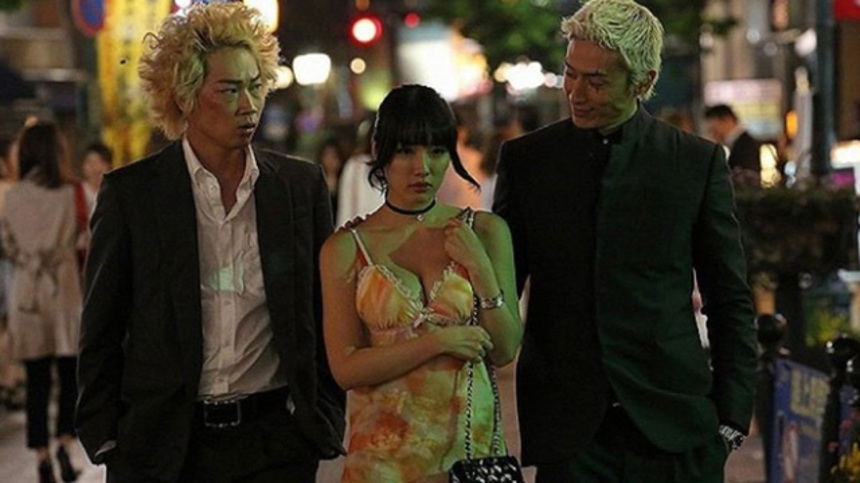Fantasia 2015 Review: SHINJUKU SWAN, Sono's Glossy Yakuza Melodrama

Sono Sion, this one of his apparently six feature films to be released this year, turns in his glossiest picture to date. Shinjuku Swan is set in the fast paced, violent world of the pimps and prostitutes that work the red-light district. In particular, it is the story of impressionable young loser Tatsuhiko Shiratori (Ayano Gô) who after arriving in the neighborhood penniless and prospectless gets in a spontaneous smackdown of fisticuffs (the idiom of Sono these days) mere moments after arriving in the red-light district. He is spotted, and deemed worthy of heart by 'scout captain,' Mako Matora (Iseya Yusuke) who buys Tatsuhiko a nice suit, and takes him under his wing at Team Burst.
Mako is kind of the Sherlock Holmes of pimps, and he teaches his new protege how to identify and talk to ambitious if broken girls of a certain beauty with the goal of convincing them to join the massage parlours and brothels as ladies of the night. Burst gets a 10% cut of the girls revenue, and that money filters down to the small army of scouts, lieutenants and captains working the streets. However, Team Burst is in competition with the wilder, crazier Team Harlem, who are set on upsetting the delicate balance of territories in Shinjuku with the goal of a monopoly and expanding its purview of business ventures.
Tatsuhiko, sweet a heart and gentle despite his willingness to scrap when necessary, falls in love with almost every one of the girls he recruits. He is the handsome young pimp with a heart of gold, and Sono echoes this with one of his girl's, Ageha's, favourite books: "The Phantom Prince," a hardback childrens fairy tale that features a cutely drawn protagonist who shares his wild & cute blonde tresses. The book and the boy are handsomely photographed by the anamorphic lensed camera which is the most western-looking Sono picture to date.
With the music and the rags-to-riches in big-town narrative, a scrappy young man with heart trying to save weeping, drugged out women while at the same time a pawn in a larger chess match, close-ups and big swelling music and outsized emotional histrionics, this may perhaps be the first true Yakuza melodrama. And indeed Sono seems to be channelling Vincente Minnelli (with a touch of Douglas Sirk) in between the chaos that ensues during the tumultuous merger of two scouting gangs as they try to hold the Yakuza at bay. With Tatsuhiko's power-mad rival in team Harlem, Hideyoshi (Yamada Takayuki) and his Tatsuhiko's heartfelt desire to what is right for his girls creating it own micro-storm inside the macro-storm of bosses in the ecosystem of Shinjuku.
There is no winking irony or any of the usual gonzo meta-ness present in the prolific director's cinema, making the story straight up tale of redemption and love on the tear stained glowing streets. But that this is a Sono picture, there is a mid-level lieutenant tortured by having bowling balls tossed down lanes towards his pinned down face, uncomfortably battered prostitutes, machiavellian geisha mistresses, angry wasted youths with the mantra, "Lets Start Some Shit!" And perhaps the most uncomfortable use of a disposable water bottle ever on camera. Now, I know what you are thinking about that last thing, but no its not sexual, despite this being the story of pimps and whores, there is no actual sex really in the movie which could comfortably be rated PG-13, mostly for violence. Shinjuku Swan is in fact a glossy, widely accessible picture with a very broad commercial sensibility.
As someone admittedly in the throes of Sono fatigue as he enters his early-aughts-Miike output phase, this was a welcome change of pace. However, this is still very much an auteur film. So, of course there are huge groups of men posturing in great suits and scrapping with one other often. With all the red blood stains on crisp white shirts and Armani blazers, I can only imagine the drycleaning budget of this film. A great image features gang Burst and Gang Harlem on the rooftops with the lights at their feet and sky-scrapers surrounding them. Gorgeous Gods astride the twinkling heavens. And Sono is still managing to find new camera angles, an overhead shot of the demise of a key character is as quietly evocative as anything he has done (perhaps subtly referencing the early work of idiosyncratic Korean director Lee-Myung Se.) His technique of having Tatsuhikio walk through, literally, his own past is simply magnificent. And the final shot showcasing all the characters and their place in Shinjuku running on the heady fumes of their ambitions and broken pasts as they race towards more business, love, violence and suffering is really all you need to know about how to make a masculine moral mean-streats melodrama about street gang corporate mergers.
Shinjuku Swan
Director(s)
- Sion Sono
Writer(s)
- Ken Wakui (manga)
- Mataichirô Yamamoto (screenplay)
- Osamu Suzuki (screenplay)
Cast
- Takayuki Yamada
- Yûsuke Iseya
- Erika Sawajiri
- Gô Ayano

Do you feel this content is inappropriate or infringes upon your rights? Click here to report it, or see our DMCA policy.






